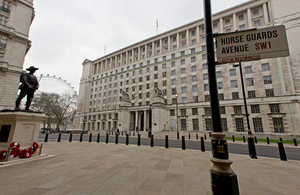Pupils in the most disadvantaged schools will benefit from high quality, specialised STEM teaching following a £60 million investment to attract and retain the top teaching talent.
Significant new payments for teachers of STEM subjects in disadvantaged areas, alongside funding for over 1,400 schools to improve the quality of their buildings, form a part of the Government’s continued drive to level up education across England. This will help ensure every child receives a world-class education giving them the opportunity to fulfil their potential and secure the jobs needed to support our economy, no matter where they grow up.
Maths, physics, chemistry and computing teachers in their first five years of teaching will be able to claim up to £9,000 over three years in tax-free bonuses from September, if they work in disadvantaged schools.
The Levelling Up Premium, expected to be worth £60 million over the three years, is intended to improve pupil outcomes across the country by helping to retain specialist teachers working in disadvantaged areas. High quality STEM teaching, delivered by teachers specifically trained in these subjects, will also more effectively support pupils who fell behind during the covid pandemic.
The Levelling Up Premium will help raise school standards in the near term, and also boost employment and opportunities for pupils in the future by enabling them to fill skills gaps and secure higher wage jobs, in turn benefitting the broader economy.
Education Secretary Nadhim Zahawi said:
The quality of pupils’ education in crucial subjects like maths and science should not be dependent on where they live, and teachers shouldn’t feel that they must leave their local area for a better paid job.
Our Levelling Up Premium will help give children and young people the best specialist teaching in maths, physics, chemistry and computing, while supporting jobs in low-income areas, helping to level up education for all and grow the economy.
Teachers working in the 55 local authorities designated as Education Investment Areas (EIA) will be able to claim the maximum bonus of £3,000 per year, if they also work in one of the 30% most disadvantaged schools in the country, determined by the number of pupils eligible for the pupil premium.
This builds on the Schools White Paper, which sets a blueprint to radically raise education standards across the country and places a significant emphasis on supporting teachers through training and salary investment, to make sure that every child can be taught by an excellent teacher.
The Levelling Up Premium is also the latest step towards delivering the government’s numeracy ambitions set out in the Schools White Paper. Strengthening the maths teaching in the most deprived schools will support schools in achieving the ambition for the average GCSE grade to rise from 4.5 to 5 by 2030.
This comes as £498 million from the government’s school Condition Improvement Fund has today been allocated to 1,405 schools and sixth form colleges across the country most in need of improvements to the quality of their buildings. This will help ensure children and young people have access to high quality, modern learning environments no matter where in the country they grow up.
Up to 7,000 teachers across around 4,500 schools in England will benefit from the premium. Teachers will receive scaled bonuses if they work in less disadvantaged schools or outside EIAs.
The Levelling Up Premium comes alongside other milestone policies set out in the Schools White Paper to train and support excellent teachers. As part of these, the government aims to provide 500,000 teacher training and development opportunities by 2024, including two new specialist National Professional Qualifications in literacy and early years leadership, as well as a £30,000 starting salary for teachers to attract and retain the very best talent.
Jenni French, Head of Teacher Supply Programmes, Gatsby Foundation said:
Gatsby’s recent research showed that paying salary premiums can have an effect on the number of teachers choosing to remain in the classroom; so the Levelling Up Premium should be seen as a positive move which should increase the numbers of students being taught by specialist teachers in poorer areas.
The Premium follows the Mathematics and Physics Teacher Retention Payments scheme piloted in the academic years 2019/2020 and 2020/21.
It will be offered alongside the legacy Early Career Payments that the government is continuing to pay to eligible teachers who started Initial Teacher Training up until academic year 2020/21.
